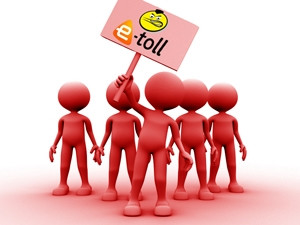
Bribery, a rise in unlicensed vehicles, fake licence opportunists and legal challenges are all realities government faces in the wake of its new e-toll funding model, which is now linked to vehicle licence renewals.
The controversial issue of e-tolls is back on the public agenda, after having gone relatively quiet for some time while Gauteng - and SA at large - waited for deputy president Cyril Ramaphosa to announce how the system would be dealt with going forward.
The deputy president finally put to rest almost a year of speculation following the e-toll review that was initiated in 2014, outlining a new e-toll "dispensation" in Cape Town yesterday.
While the d'ej`a vu move of slashing e-toll tariffs and lowering the monthly cap was widely expected - although not welcomed - government's assertion that motorists will not be able to renew their vehicle licences unless they pay all outstanding fees, was not.
The notion has sparked anger and renewed defiance, evidenced on social media platforms and online forums. The overriding sentiment is one of indignation over government saying it has been "responsible and responsive" by listening to the public - which has called for the system to be scrapped in favour of a fuel levy.
Meanwhile, the new lower fees and administration model have been outwardly rejected and criticised by anti-toll factions, with the likelihood of a legal challenge underlining their rhetoric.
Legal fight looms
The Opposition to Urban Tolling Alliance (Outa), which is no stranger to legal challenges against the system, says the public will not fall for the "carrot" of lower tariffs, any more than opposition groups will accept what they believe to be an "unjust system".
Outa chairman Wayne Duvenage says, while government may think it has resolved its enforcement issues by linking the payment of e-tolls to the renewal of vehicle licences, it has overlooked "the many other unintended consequences" its decision will give rise to.
"We believe this action will spawn a whole new illegal licence discs and number plate industry in SA. It will also force many road users to drive unlicensed vehicles. Cars will be licensed in other provinces and several other problems for the vehicle licensing authorities will arise out of this decision."
Duvenage says there is "bound to be" a legal challenge mounted against this decision. Although he did not comment specifically on whether Outa was considering going the legal route again, he said legal challenges "will come from many corners".
Rival reaction
The Economic Freedom Fighters has called government's enforcement of payment for public road use an "infringement of the freedom of movement". The party said yesterday South Africans wanted a "total eradication of e-tolls and its fees" - and not a price reduction.
"The government has [again chosen] profit over the people. The e-tolls were the result of bad governmental decisions and this must not be carried by the public. Government should seek alternative means of raising funds to improve public infrastructure."
Democratic Alliance leader Mmusi Maimane says yesterday's announcement reveals the e-tolls advisory panel was a "betrayal" of the people of Gauteng. "The people said scrap e-tolls, but the ANC has said e-tolls are here to stay."
Maimane says this is despite "clear evidence" that the system is collapsing. "E-toll payments have dropped from R120 million in June 2014, to R45 million in January 2015, [while] the SA National Roads Agency's (Sanral's) monthly cost recovery targets have risen from R108 million to R204 million over the same period."
Freedom Front Plus (FF Plus) parliamentary spokesperson on transport, Anton Alberts, says the party will oppose the new e-toll dispensation "in any way possible. The FF Plus still says e-tolls should be scrapped. The action group will continue with court action to have e-tolls declared illegal and will in due course issue a statement on this."
Justice Project SA chairman Howard Dembovsky says it is a pity government insists on trying to make "what has already demonstrated itself to be a failed and unworkable system", work. "[E-tolling] is additionally enormously unpopular and entirely inappropriate for SA."
Sanral silence
Meanwhile, the SA National Roads Agency (Sanral) - the state-owned agency in charge of the system - was uncharacteristically quiet during yesterday's announcement, allowing the Department of Transport to field questions. Sanral has since welcomed the latest decision around e-tolls and says it hopes the matter is now laid to rest.
Sanral CEO Nazir Alli lauded Ramaphosa, transport minister Dipuo Peters, finance minister Nhlanhla Nene and Gauteng premier David Makhura for finding a solution that represents "a win-win for both road users and Sanral".
The roads agency has suffered severe financial setbacks over the e-toll saga, which saw a series of delays and legal challenges prior to going live in December 2013. It has since seen no more than 45% compliance, which translates to R120 million per month - R130 million short of its original target.
Ramaphosa said yesterday the latest discounts - up to 50% off tariffs and caps and 60% off outstanding fees - would create a funding shortfall of R390 million.
Share